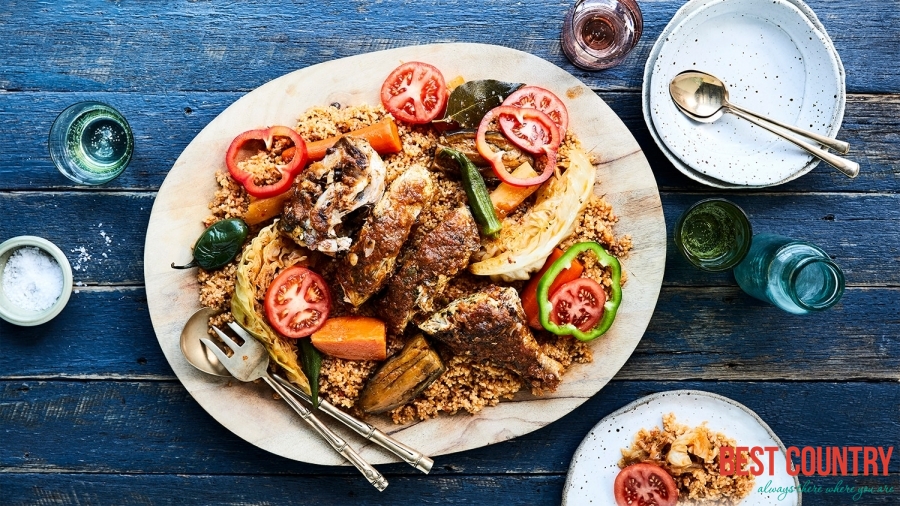The cuisine of Mauritania includes the culinary practices of the West African nation of Mauritania. Historically, what is now Mauritania, has been influenced by Arab and African peoples who have lived in and traversed the "stark" landscape marked with Sahara desert dunes in caravans.
Mauritanian Cuisine
 There is overlap with Moroccan cuisine in the north and Senegalese cuisine in the south. French colonial influence (Mauritania was a colony until 1960) has also played a role in influencing the cuisine of the relatively isolated land.
There is overlap with Moroccan cuisine in the north and Senegalese cuisine in the south. French colonial influence (Mauritania was a colony until 1960) has also played a role in influencing the cuisine of the relatively isolated land.
Alcohol is prohibited in the Muslim faith and its sale is largely limited to hotels. Mint tea is widely consumed and poured from height to create foam. Traditionally, meals are eaten communally.
Dishes
Traditional dishes include:
Thieboudienne (Cheb-u-jin), a coastal dish of fish and rice, which is considered the national dish of Mauritania. It is served in a white and red sauce, usually made from tomatoes.
Mchoui, whole roasted lamb
Spiced fish
Rice with vegetables
Fish balls
Dried fish
Dried meat
Couscous
Goat stuffed with rice
Camel (unusual)(made from Dromedaries)
Caravane cheese
Yassa poulet, chicken rotisserie with vegetables served over french fries or rice. It is originally a Senegalese dish from the Wolof and Pulaar tribes.
Mahfe, goat or camel meat in a peanut, okra and tomato sauce. It is served over rice and can also be made without meat (for vegetarians).
Yassa fish
Hakko, leaf sauce with beans over couscous
Lakh, cheese curds or yoghurt with grated coconut served over sweet millet porridge
Al-Ach
Marolaym
Bulgur wheat with dried fruit
Maru we-llham, meat with rice and vegetables
Mauritanian terrine
Camel Chubbagin
Cherchem, Mauritanian lamb couscous
Fish pastry
Mauritanian vermicelli
Harira, Mauritanian soup dish
Mauritanian pepper steak with coconut
Banaf
Leksour, Mauritanian pancakes with meat and vegetable sauce
Avocado pudding
Bonava, a lamb stew
Maff, meat and vegetables in a peanut-based sauce
Roselle syrup (Sirop de Bissap)
Al-Ach, chicken, beans and couscous
Beverages
Mint tea
Zrig, camel milk (made from Dromedaries)
Avocado smoothie
Baobab fruit drink (Jus de Bouye)